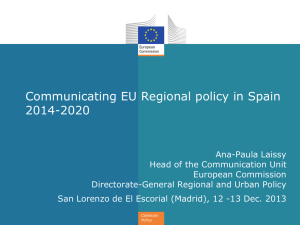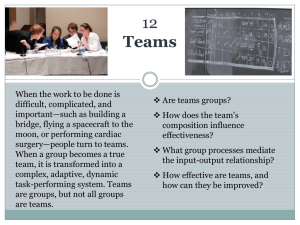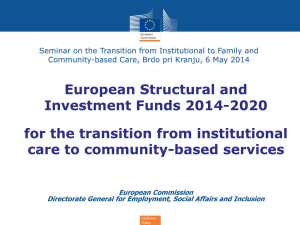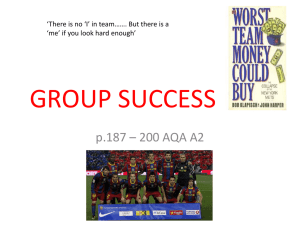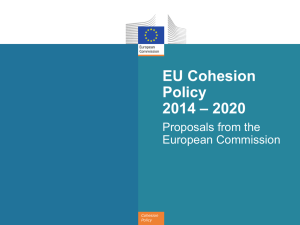Enrica Chiozza
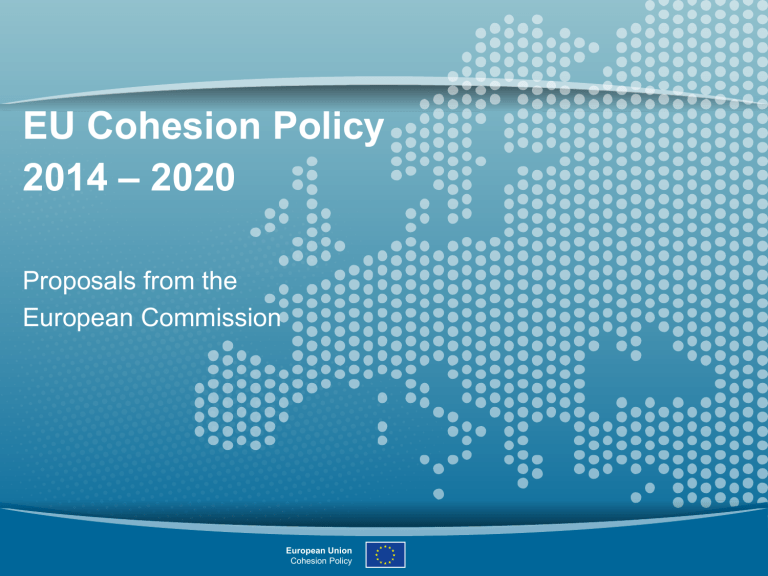
EU Cohesion Policy
2014 – 2020
Proposals from the
European Commission
European Union
Cohesion Policy
Legislative package
• The General Regulation
• Common provisions for cohesion policy, the rural development policy and the maritime and fisheries policy
• Common provisions for cohesion policy only (ERDF, CF, ESF)
• Fund specific regulations
•
ERDF regulation
• CF regulation
• ESF regulation
• ETC regulation
• EGTC regulation
European Union
Cohesion Policy
│
2
Objectives and Budget
• Primary objective of EU cohesion policy: to reduce the significant economic, social and territorial disparities between Europe's regions
• Cohesion policy: key role in delivering the Europe 2020 objectives
• Proposed budget for Cohesion Policy: 376 Billion €
European Union
Cohesion Policy
│
3
Proposed EU budget 2014-2020
Cohesion Policy
33% ( €336 billion)
Other policies
(agriculture, research, external,…)
63% (649 billion)
Connecting Europe Facility
4% ( €40 billion)
"Ambitious but realistic" proposals by the Commission in June 2011 for a Multiannual Financial Framework 2014-2020
European Union
Cohesion Policy
│
4
Budget for Cohesion Policy post 2013
Cohesion Fund*
Less developed regions
Transition regions
More developed regions
Territorial Cooperation
Extra allocation for outermost and northern regions
TOTAL
Connecting Europe facility for transport, energy and ICT
TOTAL
* Cohesion Fund will ringfence 10 billion EUR for the new Connecting Europe Facility
European Union
Cohesion Policy
│
5 billion EUR (2011 prices)
68.7
162.6
39.0
53.1
11.7
0.9
336.0
40.0
376.0
Financial Framework
Reinforcing a fair system for all EU regions
• Three categories of regions:
– Less developed regions (GDP per capita < 75% of EU average)
– Transition regions (GDP per capita between 75% and 90%)
– More developed regions (GDP per capita > 90%)
• Why a new category for transition regions?
– Simpler and fairer system
– Helps these regions to soften the transition between less and more developed regions
European Union
Cohesion Policy
│
6
European Union
Cohesion Policy
│
7
Main Objectives
•
Deliver the Europe 2020 strategy objectives of smart, sustainable and inclusive growth.
•
Focus on results.
•
Maximise the impact of EU funding.
European Union
Cohesion Policy
│
8
Main changes: Reinforcing effectiveness and performance
Focus on results
– common + programme-specific indicators, reporting, monitoring & evaluation
Performance framework for all programmes
– clear and measurable milestones and targets
Performance reserve
– 5% of national allocations (by Member State, fund and category of region)
Ex-ante conditionality
– ensuring conditions for effective investment are in place
Macro-economic conditionality
– alignment with the new economic governance
European Union
Cohesion Policy
│
9
Strengthening the Strategic Approach
Common Strategic Framework – Key actions for
Thematic objectives derived from Europe 2020
Partnership contract:
- Ex-ante conditionalities
- Performance framework
Adoption of Operational
Programmes
European Union
Cohesion Policy
│
10
A menu of thematic objectives
• research & innovation
• information and communication technologies (ICT)
• competitiveness of Small and Medium-sized Enterprises (SMEs)
• shift towards a low-carbon economy
• climate change adaptation & risk prevention and management
• environmental protection & resource efficiency
• sustainable transport & removing bottlenecks in key network infrastructures
• employment & supporting labour mobility
• social inclusion & combating poverty
• education, skills & lifelong learning
• institutional capacity building & efficient public administrations
European Union
Cohesion Policy
│
11
Simplification
Common rules - funds covered by Common Strategic Framework
– cohesion policy, rural development and maritime + fisheries policy
Option of multi-fund programmes
– ERDF, ESF and Cohesion Fund
Streamlined delivery system
– harmonised rules on eligibility and durability
– greater use of simplified costs
– linking payments with results
– e-Cohesion: one stop shop for beneficiaries
– proportional approach to control
European Union
Cohesion Policy
│
12
Concentrating resources to maximise impact
Concentration of ERDF investments on:
• energy efficiency & renewable energy
• research & innovation
• competitiveness of SMEs
6%
60%
20%
44%
More developed & transition regions
• flexibility – different regions have different needs
• special arrangements for ex-convergence regions
European Union
Cohesion Policy
│
13
Less developed regions
European Social Fund
2007-2013 2014-2020
Share of ESF within Cohesion Policy budget
25%
22%
Out of structural funds support (ERDF + ESF), ESF will represent:
• 25% in less developed regions
• 40% in transition regions
• 52% in more developed regions
European Union
Cohesion Policy
│
14
Cohesion Fund
Supports Member States with GNI per capita < 90% of EU27 average
• Investing in environment
– Climate change adaptation and risk prevention
– Water and waste sectors
– Biodiversity including through green infrastructures
– Urban environment
– Low carbon economy
•
Investing in transport
– Trans-European Transport Networks (TEN-T)
– Low-carbon transport systems and urban transport
European Union
Cohesion Policy
│
15
How will funding be allocated?
Less developed regions/MS Transition regions
Cohesion Fund¹
Less developed regions
Transition regions
More developed regions
European Territorial
Cooperation
Outermost regions and sparsely populated areas
Total
68.7
100
162.6
90
38.9
53.1
80
11.7
70
0.9
60
336.0
50
40
30
20
10
¹ €10 billion from the Cohesion Fund will be allocated to the Connecting Europe Facility
0
15,8
%
11,6
%
68,7
%
Budget allocation
(in %)
European Union
Cohesion Policy
│
16
More developed regions
250
200
150
100
50
0
500
450
400
350
300
307.1
72.4
119.2
Population covered
(in millions)
Marginalised Communities focus
Current programming period
General Regulation
Art 16 Equality between men and women and nondiscrimination
ERDF Regulation
Art 7.2 Eligibility of expenditures
– housing for marginalised communities in the framework of an integrated approach.
More in general social infrastructures investments in health, education, housing and other social infrastructures
(categories of expenditures)
Programming period post 2014 – proposal
Common provisions
Ex-ante conditionality for the thematic objective of promoting social inclusion and combating poverty.
Art 5 partnership and multi-level governance – including economic and social partners, civil society etc in the preparation of the Partnership
Contract
Art 7 Promotion of equality between men and women and non-discrimination
-MS have to set in place a
-National strategy for poverty reduction, containing a mapping of the territorial concentration beyond the regional/on NUTS 3 level of marginalised and disadvantaged groups including Roma
Art 14 c and 87 d: Contents of the partnership agreement: integrated approach to address specific needs of geo areas OR target groups most affected by poverty.
-National Roma inclusion strategy
ERDF
Chapter II Community-led local development
Priority of promoting social inclusion and combating poverty
European Union
Cohesion Policy
│
17
Poverty Mapping
Optional tool to implement Article 14 (c) and 87(d) of CPR
• MS to have in place a national strategy for poverty reduction.
• Member States may choose between
– geographical appproach: identify geographical areas most affected by poverty, possibly through poverty mapping
OR
– target group approach: identify the target groups at highest risk of discrimination or exclusion (e.g. Roma, migrants, disabled people etc)
– possibly using maps to more efficiently target funds.
• All CSF Funds may be mobilised.
• Integrated approaches to be set out in the Partnership Contract and
Operational Programmes, including indicative financial allocations for the relevant CSF Funds.
European Union
Cohesion Policy
│
18
Timeline
5 th Report on
Economic,
Social and
Territorial
Cohesion + public consultation
Proposals for
Cohesion
Policy
2014-2020
Public consultation on
Common
Strategic
Framework
2012 – 2013
March
2010
Adoption of
Europe 2020
Strategy
Nov.
2010
June
2011
Proposal by the
Commission for a
Multiannual
Financial
Framework
Oct.
2011
Dec.
2011
Communication from the
Commission:
Common
Strategic
Framework
Jan.
2012
Agreement on
MFF and adoption of new legislative package
2014
Entry into force and adoption of programmes
│
19
Where can I find further information?
www.inforegio.europa.eu
Follow @EU_Regional on Twitter
European Union
Cohesion Policy
│
20

